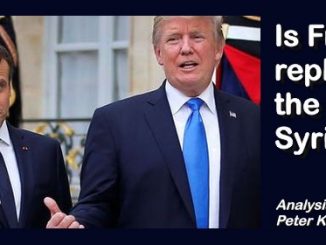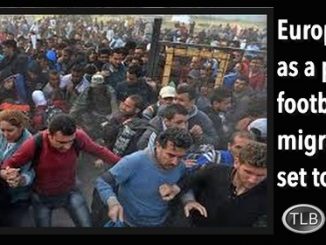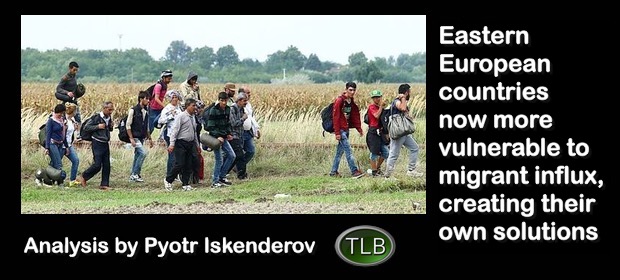
Will Muslim Migrants Stop the Depopulation of Europe?
PYOTR ISKENDEROV
The Balkans are being threatened with a new influx of refugees and illegal immigrants from Turkey – not just by land this time, but also by sea. In recent days, the relevant services of Romania and Bulgaria have recorded a significant increase in the number of migrants trying to cross the Black Sea to reach Bulgaria and Romania’s borders with the European Union – migration flows are clearly shifting from the Mediterranean to the Black Sea.
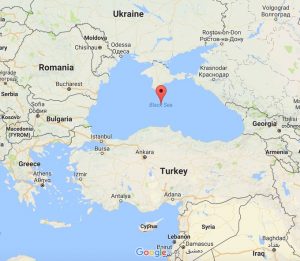 So far, Bucharest and Sofia have confined themselves to strongly worded statements. Romanian President Klaus Iohannis has warned that attempts to reach the country by sea «will be stopped», while Bulgaria’s Defence Minister Krasimir Karakachanov has promised that his country «will stop the arrival of new illegal immigrants to Europe».
So far, Bucharest and Sofia have confined themselves to strongly worded statements. Romanian President Klaus Iohannis has warned that attempts to reach the country by sea «will be stopped», while Bulgaria’s Defence Minister Krasimir Karakachanov has promised that his country «will stop the arrival of new illegal immigrants to Europe».
Both Romania and Bulgaria quite rightly suppose that their countries are not the ultimate destination of the migrants arriving from Turkey by sea. «We do not yet seem to be an attractive final destination», notes the Romanian newspaper Active News, among others.
It doesn’t make the problem any simpler, however, since its origins go far beyond Southeast Europe. Turkish President Recep Tayyip Erdoğan has repeatedly made it clear to the European Union that he is prepared to «raise the barrier» for three million new potential refugees waiting to pour into the Balkans. And then the barbed wire fences along the Turkish border that have already been promised by the Bulgarian Defence Ministry and the «complex surveillance system» in the Black Sea will be unlikely to deter the influx of Muslims pouring into Europe.
The refugee «quota system» for EU member states developed back in 2015 by the European Commission has proved to be just as ineffective and hasty. Generally speaking, the EU quotas are not working. Here is a clear example: over the last two years, Romania has managed to get Brussels to reduce the country’s quota three times – from 6,000 to 2,000 people – despite the fact that the main influx of refugees heading for Austria, Germany and the other leading EU member states is coming from Southeast Europe.
The difficult demographic situation facing European countries, particularly those in Eastern Europe, is adding to the EU leaders’ inability to solve the refugee and migrant crisis. Experts have calculated that it is the countries of Eastern Europe that are particularly vulnerable to the so-called depopulation bomb – a catastrophic decline in birth rates. The London newspaper The Financial Times has referred to the problem as «the largest population loss in modern history». According to the UN, there were about 292 million people in Eastern Europe in 2016, 18 million (the population of the Netherlands!) less than in the early 1990s. And this trend is continuing.
Experts believe that Romania will lose 22 percent of its current population by 2050. The country’s birth rate has almost halved compared to 1990. The population of Bulgaria, meanwhile, is expected to fall by more than 15 percent. Between 2015 and 2016 alone, the birth rate in Croatia fell by 20 percent, and the population of this former Yugoslav republic could fall a further 16 percent by 2050.
And this is all happening amid an influx of migrants from Muslim countries that have the opposite demographic trend. Unsurprisingly, European governments are doing 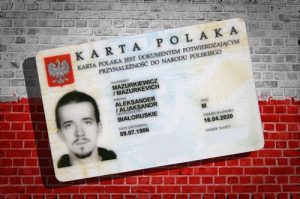 everything they can to find their own solutions to the problem, including the kind of solutions that are giving Brussels a massive headache. Poland, in particular, has followed Hungary’s example by introducing «ethnic passports» (Karta Polaka or Polish Cards) for those arriving from the former Soviet republics who speak at least a little Polish, claim Polish roots, and «have an understanding of the country’s culture». Those in possession of a Karta Polaka can use it to immediately start studying and working, and, just a year after receiving the card, they can apply for a permanent residence permit, which is an interim step towards obtaining EU citizenship.
everything they can to find their own solutions to the problem, including the kind of solutions that are giving Brussels a massive headache. Poland, in particular, has followed Hungary’s example by introducing «ethnic passports» (Karta Polaka or Polish Cards) for those arriving from the former Soviet republics who speak at least a little Polish, claim Polish roots, and «have an understanding of the country’s culture». Those in possession of a Karta Polaka can use it to immediately start studying and working, and, just a year after receiving the card, they can apply for a permanent residence permit, which is an interim step towards obtaining EU citizenship.
Since 2008, the Polish Ministry of Foreign Affairs has issued more than 200,000 of these cards, including 95,000 to citizens of Belarus and 87,000 to citizens of Ukraine. According to the information available, a further one million people will be given a Karta Polaka in the very near future.
In so doing, the Polish authorities are pursuing not only political objectives, but also economic ones. According to UN forecasts, the population of Poland will fall by six million people by 2050 – from the country’s current population of 38 million to 32 million.
This does not alter the essence of the depopulation processes currently taking place in Europe, however. The unprecedented influx of refugees and illegal migrants from North Africa and the Middle East is forcing European governments to develop mechanisms to preserve their national identities that blatantly contradict the liberal values declared by EU leaders. The EU itself, meanwhile, has fallen into a stupor and is unable to adequately respond to the changing situation – be it cultural and demographic problems, the growing terrorist threat, or a coherent and effective policy for key international issues.
Should the trend continue, every EU member country will have to introduce their own «ethnic passports».
************
Original article
ER recommends other articles by Strategic Culture Foundation
About the author
Pyotr Iskenderov is a senior researcher at the Institute of Slavic Studies


